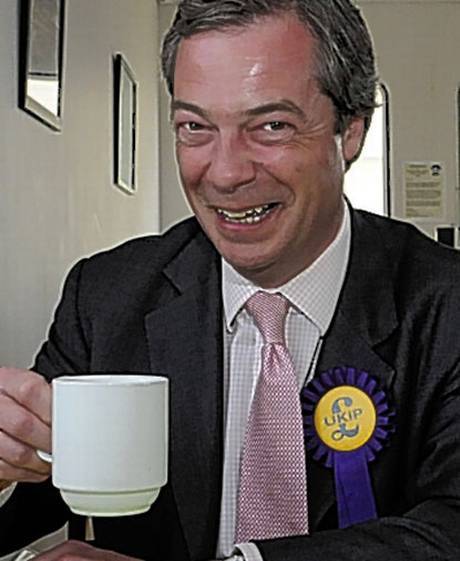Even when Jalyss' family learnt the exciting news about how David Cameron had sex with a pigs head all they wanted to talk about was the other news of the day, which was that Jalyss told them she was pregnant with Toby. Which was exciting news and all, but it's not exactly David Cameron's secret passion for pork products.
Its come as a huge shock to me then that over the last few days people have actually been stopping me to ask what exactly a Brexit is. America, it seems, woke up to the same shock and panic as Britain. It was probably no more confused than most of the country that had just thrown themselves off the cliff. If the post-Referendum reaction is any indication a sizeable proportion of the vote may have been a mistake; people certain that Remain would win taking the opportunity to all give the status-quo a kicking, safe in the knowledge that their vote wouldn't make a difference ended up on the wrong side of screwing themself.
I'll admit that I watched along with the Brexit vote as it happened, in contact with some of the other politics junkies that I know in the UK, and it quickly became clear that Leave was headed for an upset, in every sense of the word. For future reference there is something hugely upsetting about watching your country commit economic suicide in realtime. I stopped hoping for a resurgence which wasn't coming about the time that Nigel Farage declared a victory for ordinary decent people, and praised a revolution won without a "shot being fired" (other than the ones which killed Remain campaigner, Labour MP Jo Cox).
 |
| Absolutely as much of a dick as he looks |
 |
| Literally the best picture possible for this post |
Of course, the presence of Trump on the day after Brexit was an appropriately grim visitation. Standing at his financially ruinous golf course, making a speech praising his own foresight as the flaming economy desparately stop, drop and rolled off a cliff, to people who didn't want him, his business, or Brexit and have somehow ended up with all three.
Since then the pound has plunged to its lowest point in my lifetime, the British economy went from the 5th biggest in the world to the 6th in four hours, and $2 trillion was wiped off the world market, the Leave campaign admitted they have no way of doing any of the things they promised withdrawal would achieve, and the UK has collectively gone through the five stages of grief.
Denial, Anger, Bargaining, Depression ... Acceptance may be some way off. I can only imagine the power surge as millions of kettles were put on at once, as the British people instinctively responded to crisis in the only way they know how: making themselves a cup of tea and cracking jokes about the predicament we've got ourselves into. Among the outpourings of shock, horror, confusion and loss, we found time to make memes, and spawned dozens of pages of satire to get us through the day.
There has been a predictable response in the aftermath about unity and looking to the future, although most of the hand-wringing has come from the defeated Remain camp, with little in the way of gracious victory from Leave. With a country totally divided, it's interesting (if a little disheartening) to look at the demographical split between Leave and Remain.
For those who aren't interested in charts of post-Referendum demographic breakdowns, first of all what's wrong with you?, and second of all, here's the short version. The areas that voted to leave were those with less money, fewer people with a higher education, and an older population. Some of the splits are surprising. Class and poverty were seemingly more important than race; ethnically diverse but post-industrial Birmingham voted leave, along with Britian's Northern rust-belt. Areas with high levels of immigration voted leave, but more heavily if the local economy was struggling. and over 65s were almost a mirror opposite of 18-25s. In each case there was a 3/1 split, with pensioners voting to leave, while the younger generation voted to remain.
This, somehow, has become the defining narrative of the vote. A generation which got to enjoy all the benefits of membership of the EU whilst they were working have propelled England out of Europe. The reaction has been swift and predictably blunt; many of the memes circulating discuss the younger generations anger that people who'll be dead before the full consequences of Brexit are known have dumped this on the young.
There's been an equally swift backlash, decrying the young for acknowledging that death is inevitable and that old people are more likely to die first. My favourite, incidentally, is the claim that if it wasn't for old people we would all be speaking German, which hilariously combines Godwin's Law with an inability to do the math on exactly who is over 65, and how likely it is that they fought in World War Two.
 |
| The age a 70 year old would have had to have been to fight in WW2. |
The Left in particular seem hamstrung by how to respond now that their base constituency of working-class voters has pushed Scotland to the brink. This may be the biggest political consequence of Brexit. If Jemery Corbyn is deposed and Labour try to move back to the centre it's hard to see how they can survive. Competing for Tory voters with UKIP, having already lost support in the Northern cities to the right's Little Englander policies, along with Wales and Scotland become ever more divorced from the Union, will be the death of progressive policies in England. The idea of a Left Exit from the Neo-Liberal EU has handed England to the worst elements of the Tory party for decades to come. Good luck replacing the significant workers rights legislation with anything as expansive when Johnson, Gove and Farage are in charge.
So, how do we move on from here. I wish I knew. In the short term things are bad and will probably only get worse. The fragile peace in Northern Ireland has been undermined, Scotland are trying to negotiate their own deal with the EU and a second referendum on independence is far more likely to be successful now. The factional, xenophobic rhetoric of the leave campaign will only grow, and while theres already signs that many Leave voters are starting to regret their choice, it's only going to get worse once the actual impact is felt.
It's not like it's in the EU's best interest to make it easy for us. The opposite in fact. If they want to discourage other countries lining up behind Britain to leave they need to make it as punishing as possible for us. It shouldn't surprise anyone when they say they want us out as soon as possible, or immediately start talking about abandoning current agreements on immigration or trade. Why work with a country that's decided to abandon you? Why protect people who don't want to do anything in return?
By any measure, Britain is worse off for this vote. Its easy to say we need to reunite, It's a lot harder to do it. And just think, we wouldn't even be here, if it had been left to those meddling kids.


